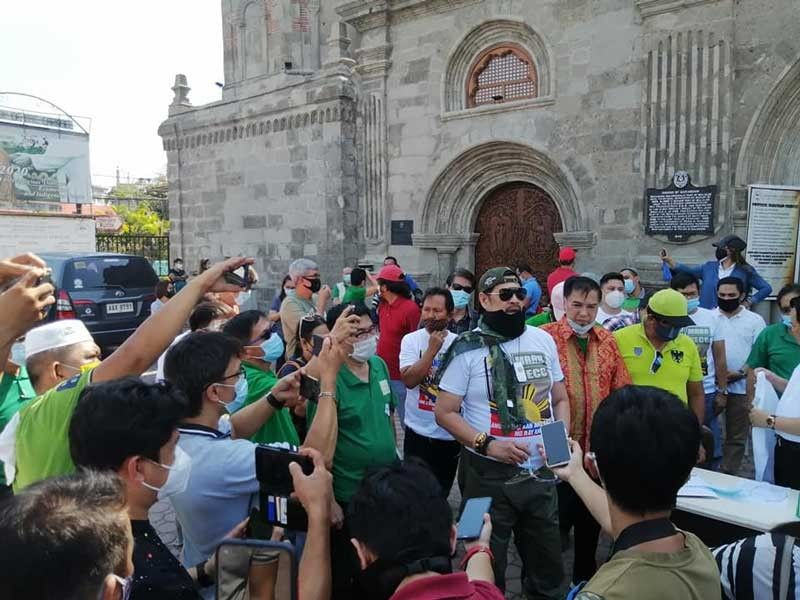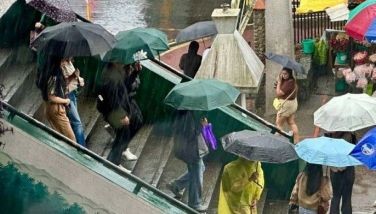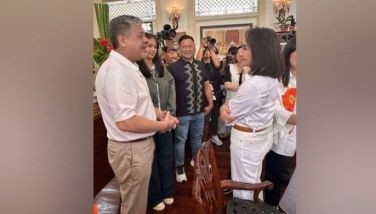Whatever happened to: Supposed probe into call for 'revolutionary government'

MANILA, Philippines — The police do not have records of any investigation into the Mayor Rodrigo Roa Duterte-National Executive Coordinating Committee, a volunteer group that made headlines in August 2020 for openly calling for a "revolutionary government" headed by President Rodrigo Duterte.
The group's name came up anew after it was named in a statement supporting presidential candidacy of Ferdinand Marcos Jr., the son and namesake of the ousted dictator.
On December 3, Partido Federal ng Pilipinas Secretary-General Thompson Lantion claimed that Abubakar Mangelen — who filed a petition to declare Marcos' Certificate of Nomination and Acceptance null and claimed he was the legitimate chairman of PFP — was ousted from the political party because of his membership in the MRRD-NECC.
"There is an open investigation of the PNP-CIDG in Camp Crame against these illegal activities of MRRD-NECC," Lantion said in a statement on December 4.
According to its spokesperson, though, the PNP's Criminal Investigation and Detection Group does not have any records of any investigation into the group or its calls to establish a "revolutionary government", a call that has come up more than once during the Duterte administration.
RELATED: Can Duterte declare a revolutionary government?
"After how many days of researching our records, we did not find any investigation relative to the matter. Our staff here also said they didn't see anything," Police Lt. Col. Ramon Sawan, public information officer of the PNP-CIDG told Philstar.com in a phone call.
Call for 'revolutionary government'
Some 300 supporters of President Rodrigo Duterte assembled at the Clark Freeport in August 2020 to call for a "revolutionary government" to be headed by the president himself until 2022.
The Philippine National Police dodged questions about the rally at the time, but not before its chief vowed a probe.
"I have directed the CIDG to investigate the individuals behind it and to determine if there is any basis to file criminal charges," then-PNP chief Archie Gamboa was quoted as saying in reports by Inquirer, Rappler, and state-run Philippine News Agency. "Political stunts such as this are ill-timed considering that we are in the midst of fighting the COVID-19 pandemic."
Gamboa, now a retired general, also acknowledged receiving an invitation to the event through Viber.
"I was informed that letters were sent out to several government agencies inviting us to attend their supposed assembly. The information was then leaked to the media making it appear that we were involved or worse, that we consented to it," Gamboa also said according to a Manila Bulletin article.
But the issue went away quietly as the government wrestled with a worsening pandemic.
What happens now?
Asked if it could have been a clerical error given the numerous turnovers of PNP chiefs since then, Sawan said: "No, the [information] is maintained. We have a next-generation investigation system. So any investigation, any records of any crime or offenses will be recorded in the system. If there is anything, it doesn't disappear."
Does that mean there could still be investigations into the call for a "revolutionary government"?
"If there will be a directive from the chief, surely there will be an investigation," Sawan said.
This is not likely as Police Gen. Dionardo Carlos was appointed in November, long after MRRD-NECC made the call. MRRD-NECC also has members in the government.
Lawyers, academics, and other government officials were quick to question the constitutionality of the calls at the time. According to the provision on the crime of inciting to sedition under Article 142 of the Revised Penal Code:
The penalty of prision correccional in its maximum period and a fine not exceeding 2,000 pesos shall be imposed upon any person who, without taking any direct part in the crime of sedition, should incite others to the accomplishment of any of the acts which constitute sedition, by means of speeches, proclamations, writings, emblems, cartoons, banners, or other representations tending to the same end, or upon any person or persons who shall utter seditious words or speeches, write, publish, or circulate scurrilous libels against the Republic of the Philippines or any of the duly constituted authorities thereof, or which tend to disturb or obstruct any lawful officer in executing the functions of his office, or which tend to instigate others to cabal and meet together for unlawful purposes, or which suggest or incite people against the lawful authorities or to disturb the peace of the community, the safety and order of the Government, or who shall knowingly conceal such evil practices.
What about the controversial Anti-Terrorism Act, which classifies “engaging in acts to cause extensive interference with, damage or destruction to critical infrastructure” as terrorism? Or what about rules on mass gatherings amid the coronavirus pandemic?
According to Sawan, "We cannot say, because someone has to come forward and file a case."
"Somebody has to come forward and tell us that those things happened unless our police investigators were the ones to witness the incident," he said. "We have no idea about it."
The MRRD-NECC's National Convention in 2018 was carried by the social media channels of the Radio Television Malacañang, the Presidential Broadcast Staff. RTVM in the past also carried the events of the ruling PDP-Laban, the political party of Duterte.
READ: State media asked: Would you air meetings of other gov't officials' political parties?
"The MRRD-NECC is a volunteer movement that supports the president’s advocacies. The movement also envisions the institution of a federal form of government in the Philippines that would support equal opportunities for all regions," RTVM says in the video's caption.
Why does this matter?
Malacañang at the time was careful to distance itself from the group's calls for a revolutionary government but said that the group is free to express its opinion.
"The call to establish a revolutionary government came from a private group and the organizers are free to publicly express their opinion...The focus, however, of the administration is addressing COVID-19 and mitigating its socioeconomic impact," then-presidential spokesman Harry Roque said.
READ: COVID-19 deniers, anti-vaccine protesters get 'warning' from PNP chief
When COVID-19 deniers and anti-vaccine protesters held a demonstration against the government's pandemic response, former PNP chief Guillermo Eleazar said that "while the PNP respects the belief of some individuals and groups not to believe on COVID-19 and the vaccination," they should also "learn to respect the belief" of other Filipinos.
Despite the video proof of the protest going viral on both mainstream and social media, Eleazar said that the PNP will "strictly monitor if there will be protest actions by those anti-vaccine groups and individuals that would violate the minimum public health standard."
Then and now, the PNP's treatment towards administration-friendly protesters is in stark contrast to the police's heavy-handed aggression towards progressive activists since the early days of the pandemic, when urban poor residents calling for food aid were arrested in Quezon City.
Overzealous enforcement of pandemic protocols has been a significant part of the government's pandemic response and security officials have arrested people holding feeding programs and relief drives. Instances of human rights abuse is well-documented, and quarantine violators have been beaten or even shot.
READ: Back to 'disiplina'? On second day of ECQ, stories of power-tripping enforcers
When cops were instructed to practice "maximum tolerance" towards protesters at President Rodrigo Duterte's last State of the Nation Address in late July, progressive groups and activists were arrested and had their protest materials confiscated.
- Latest
- Trending






























